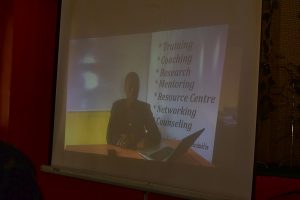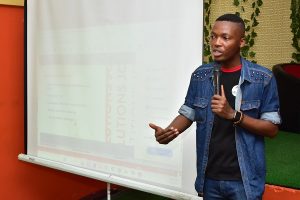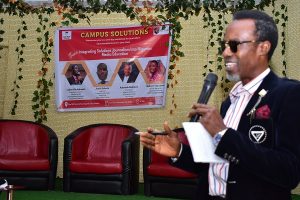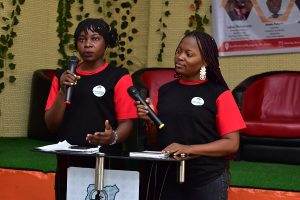
- Seek integration of solutions journalism into Nigerian media education
By Quadri Yahya
Media practitioners and journalism lecturers have canvassed the integration of the concept of solutions journalism into the curriculum of tertiary institutions in Nigeria.
The experts and scholars stated that the new generation of journalists need to be exposed to the concept of solutions journalism as part of the various ways they can cause developmental changes in the society while also holding power to account.
They also argued that reporting about society’s issues via the solutions lens is essential to change the perspectives of media audiences who view the reportage of the mainstream media as one filled with negative and bad news.
They made this call at a one-day workshop with the theme “Integrating Solutions Journalism Into Nigerian Media Education” organised by I-79 Media Consults under its Campus Solutions project as part of the 2022 LEDE fellowship supported by the US-based Solutions Journalism Network (SJN) held at the Oyo State NUJ secretariat, Ibadan on Saturday.
The aim of the workshop was to encourage journalism lecturers and educators to integrate solutions journalism into school courseworks and curriculum to the overall benefit of the students and lecturers.
 One of the facilitators who is also a lecturer and researcher at the Crescent University, Abeokuta, Jamiu Folarin, in his presentation, stated the need for universities to include solutions journalism into academic courseworks and curriculum.
One of the facilitators who is also a lecturer and researcher at the Crescent University, Abeokuta, Jamiu Folarin, in his presentation, stated the need for universities to include solutions journalism into academic courseworks and curriculum.
While sharing experiences from how he is leading the integration of solutions into courseworks in his university, he said the concept is a veritable tool to catch young students of journalism very young.
He further called on policymakers including the National Universities Commission (NUC), National Board for Technical Education (NBTE) to include solutions journalism into journalism curriculum or as a course for Mass Communication or Communication and Language Art students.
Speaking during the workshop, Executive Director of the Media Career Development Network (MDCN), Lekan Otufodunrin urged media practitioners to take to using the solutions journalism approach to report serious issues affecting the country.
While speaking on “Using Solutions Journalism to Report Salient Issues Without Making Things Worse”, he opined that journalists can also report on solutions to existing problems.
He said: “Advocacy for solutions journalism is not denying the existence of enormous problems to be reported by the media which should be reported.
 “Solutions Journalism is another approach to media reporting which journalists should adopt. To justify the need for SoJo, it has to be properly done and provide all the necessary perspectives that will make it a solutions report.”
“Solutions Journalism is another approach to media reporting which journalists should adopt. To justify the need for SoJo, it has to be properly done and provide all the necessary perspectives that will make it a solutions report.”
[flw-pay-button]
On his part, Ifedayo Ogunyemi, a 2022 LEDE Fellow and Senior Reporter with the Nigerian Tribune decried the situation whereby the negativity inherent in news reportage is further driving audiences away from media products including news reports and broadcasts programmes.
 While further discussing the pillars of solutions journalism – response, evidence, insights and limitations -, he called on practitioners and educators to envision a society where journalism also serves as a “guide-dog” and not just as a “watch-dog” in its bid to change the society for the better.
While further discussing the pillars of solutions journalism – response, evidence, insights and limitations -, he called on practitioners and educators to envision a society where journalism also serves as a “guide-dog” and not just as a “watch-dog” in its bid to change the society for the better.
He pointed out how a solutions report published by the Nigerian Tribune helped the Federal Government address its hospital bed shortage for COVID-19 patients in 2020, adding that the report also catalysed the signing of a bilateral agreement between the Nigerian and South Korea governments on the management of COVID-19 cases.
Chairman of the Nigeria Union of Journalists (NUJ) in Oyo State, Ademola Babalola, who spoke glowingly about solutions journalism also charged educators and practitioners to embrace the concept as a genre of journalism that can be used to drive accountability in the society.
One of the participating lecturers and former Head of the Department of Mass Communication at The Polytechnic, Ibadan, Olusoji Olatunji, a lecturer from the Polytechnic of Ibadan, pledged to propose the integration of solutions journalism into media education to the school authority.
His words: “It’s a new trend, especially here in Africa. I will make a proposal for the Polytechnic of Ibadan for the introduction.
 “I know that by the time we put our curriculum together by liaising with erudite scholars, there should be a paradigm shift from what we have learnt during that (old) time.
“I know that by the time we put our curriculum together by liaising with erudite scholars, there should be a paradigm shift from what we have learnt during that (old) time.
“Now, there is a need for us to tell our students that the world is changing and we have to move with the trend of change going on in the world, and this is a new trend. We need to sensitise our students about solutions journalism.”
Some of the participants also called on the mainstream media to create solutions desks to encourage veteran journalists to report solutions-focused stories.
Responding to this, Folarin said the mainstream media can include solutions journalism into their outlets without necessarily jettisoning the traditional practice of journalism.
About Campus Solutions
Speaking earlier, the Project Lead of the Campus Solutions project and Reporter with the Foundation for Investigative Journalism (FIJ) Abimbola Abatta, said the project aims to change narratives of bad reporting about the education system, adding that the project has trained over 30 campus journalists in Nigeria and Ghana.
“As of today, at least 12 whole stories about responses to the challenges facing the education sector and related issues have so far been catalysed under this project and were published on their respective campus press outfit, community, national platforms and as well as on the Campus Solutions section of I-79 Media Consults website which also serves as a database for resources and insights.
 “This project also created a network of campus journalists interested in solutions journalism where we shared stories, tips and resources on how to write general and campus-specific SoJo reports”, Abatta said.
“This project also created a network of campus journalists interested in solutions journalism where we shared stories, tips and resources on how to write general and campus-specific SoJo reports”, Abatta said.
One of the beneficiaries of the Campus Solutions project and student of Communication and Language Arts at the University of Ibadan, Olanshile Ogunrinu, said: “The goal of journalism is to hold the government accountable and effect change in society. Solutions journalism is an approach to do that,” while adding that he is presently working on solutions stories that focus on students of his institution.
Another beneficiary, Gbadegesin Adeyanju and sfudent of Ladoke Akintola University of Technology (LAUTECH), said one of the lessons he learnt during the project is how practice accountability journalism from a solution angle.”






MORE MEDIA AND JOURNALISM OPPORTUNITIES FROM I-79 MEDIA
Thomson Reuters needs a correspondent in Abuja
Thomson Reuters seeks to employ a talented and energetic correspondent to cover politics and general news in Abuja, Nigeria. APPLY HERE
Vacancy for a media advisor at SERAP
The Socio-Economic Rights and Accountability Project (SERAP) is hiring a Media Advisor to help design and produce creative content. APPLY HERE
Earth Island Journal seeks writing on environmental issues
DEADLINE: ROLLING —The Earth Island Journal seeks writers from around the world to submit pitches on environmental issues. APPLY HERE
Grant for COVID-19, vaccines, global health inequities stories
DEADLINE: ROLLING — Journalists can apply for the Pulitzer Center’s COVID-19, Vaccines, and Global Health Inequities grant. APPLY HERE
Grants for underreported stories in Sub-Saharan Africa
DEADLINE: ROLLING — The Pulitzer Center is offering grants for underreported stories in Sub-Saharan Africa. Proposals should focus on issues such as water and sanitation, land degradation and coastal erosion, education, maternal health, and climate resilience. APPLY HERE
